It happens more and more often that some malicious people try to scam us online. How to protect yourself from scams? First of all, you need to quickly understand what the scam attempt is and act accordingly. Let's see some of them.


Protect yourself from eMail scams
E-mail scams are widespread and can be of various types. In the case of phishing, the scam consists in requesting the data of the unfortunate, and then using them online. In this case, if the function is available, it is good to report the email as unwanted. To protect yourself from scams, you should never reply to the eMail, click on any links or open suspicious attachments.
In the following example, the scammer pretends to have a cash prize to give us. Its objectives could be basically two:
- have the documents delivered, so that the fraudster can use them online to create a false identity;
- extort money from the victim, pretending that, to unlock the win, it is necessary to send him money.
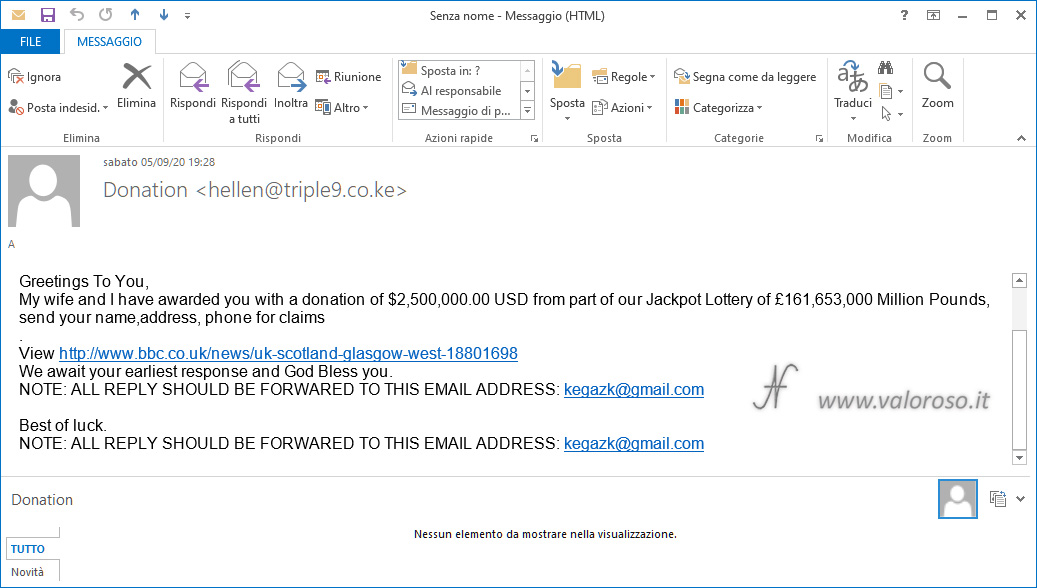
In other cases, the email may contain attachments. These are, almost certainly, virus, malware O ransomware. By clicking on the attachment, the computer would become infected immediately and, in all likelihood, the data contained in it would be destroyed. It could also be an attempt at blackmail: the hacker could demand a ransom to restore the data of the hacked computer. Therefore: better to install a good antivirus and never click on suspicious attachments, even from known people!
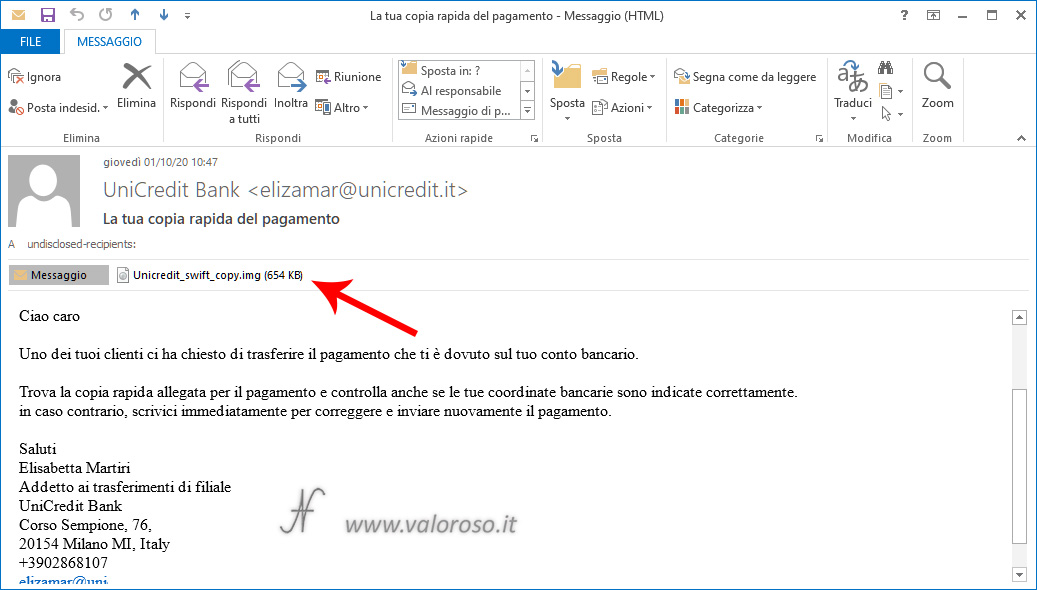
Fraudulent emails from banks and service providers
A scammer could send an eMail, pretending to be a bank, type UbiBanca, Unicredit, Intesa Sanpaolo, Fineco, Agricultural credit, Monte dei Paschi di Siena, Popular Bank, Sella Bank, BPM Bank, Ing, ecc…

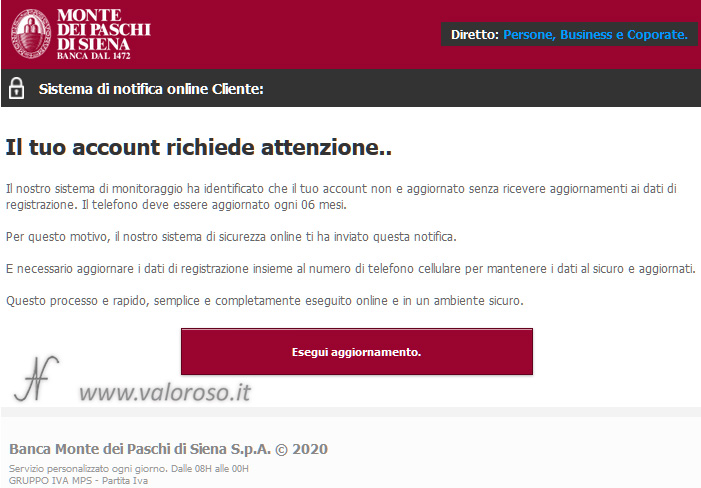
It may also pretend to send the email from a service provider, such as Aruba, TIM, Netflix, Vodafone, Fastweb, Tiscali, ecc…
The goal of the scammer is to get the login credentials to the service. The email generally contains a link. By clicking on the link, you arrive at a page very similar to that of the service provider, where access credentials are requested.
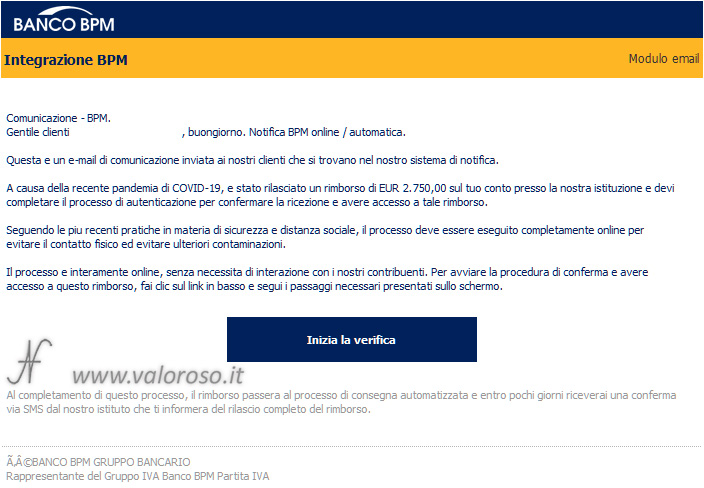
The scammer may also request an overdue payment, in this case the scam is of an economic nature.
It is easy to understand if the email does not really come from our service provider: simply bring the mouse closer to the button (or link) in the email, without clicking it. A small window opens with the address of the link. Obviously, the address will not be that of the website of the bank or service provider. It is also possible to copy the link (by clicking the link with the right key of the mouse) and paste it into a notepad, if the window does not open by bringing the mouse pointer closer. In this way, we will be able to analyze it. It is also possible to evaluate the e-mail address from which the message was sent: generally the message does not come from the real service provider.

To protect yourself from scams, of course, you must avoid following the link and, in any case, you must avoid entering the required data.
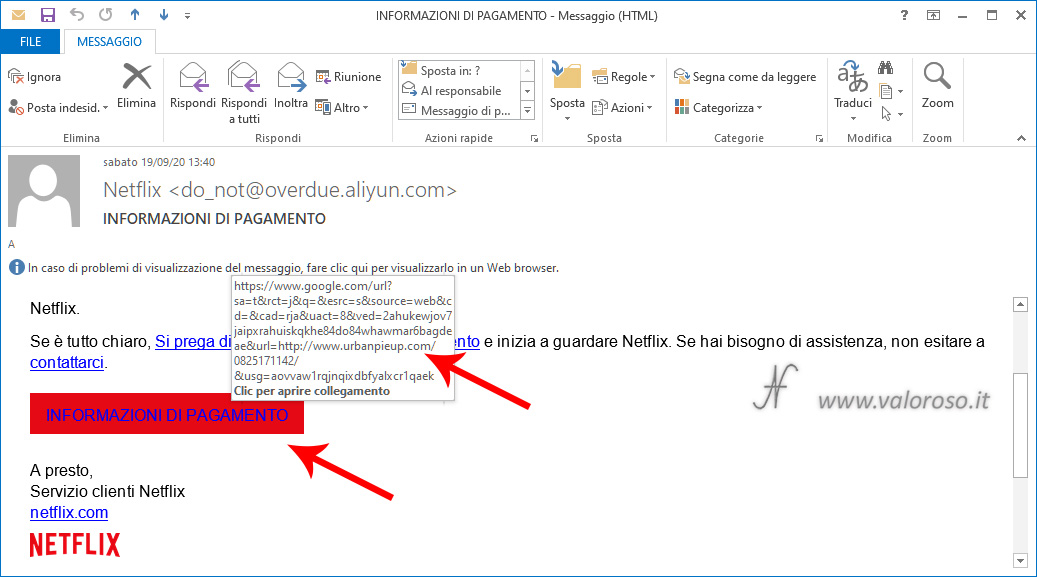
Scams on online sales sites, as a seller
The habit of selling used items on specialized sites is increasingly widespread. Normally, you place ads on Facebook Marketplace, Immediately, The village, eBay and others. There are also Apps that allow you to sell used items, such as Shpock.
Again, scams can be of different types. Not all, unfortunately, there is a remedy!
The easiest scam attempt to discover is the message of a potential buyer, who immediately asks to make the negotiation via eMail, outside the sales site. Messages are usually sent from abroad, with a broken Italian.

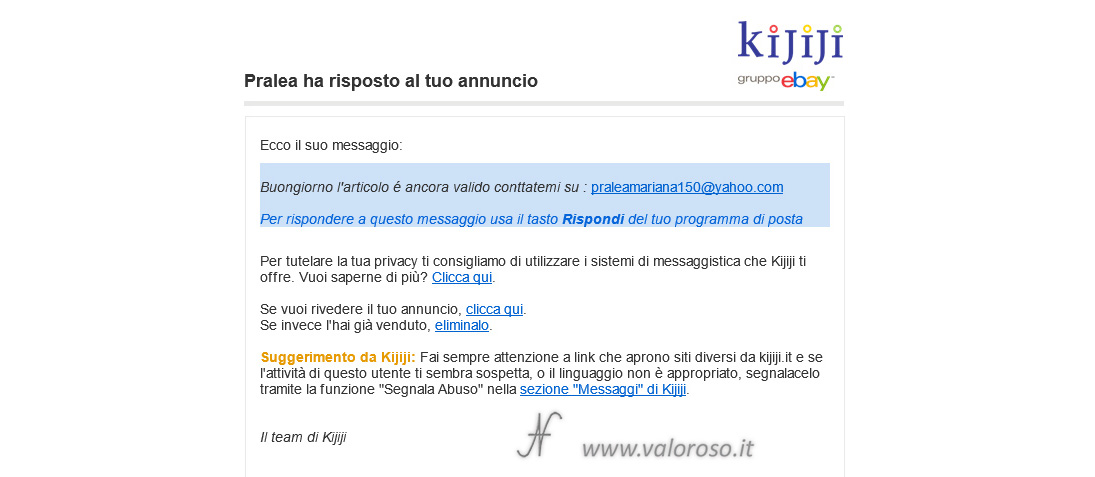
The goals of the scammer could be three:
- pretend to have sent the money, sending a photocopy of a bank transfer, and demanding the shipment of the goods;
- extort money, offering to pay more for the item for sale, as long as the seller send him money to unlock the necessary funds;
- request additional photos of the item for sale, and then pretend to sell it himself (thus scamming other potential buyers).
To protect yourself from scams, you must necessarily wait for the payment to be credited to the seller's bank account, before shipping the goods. Never send money to the buyer!
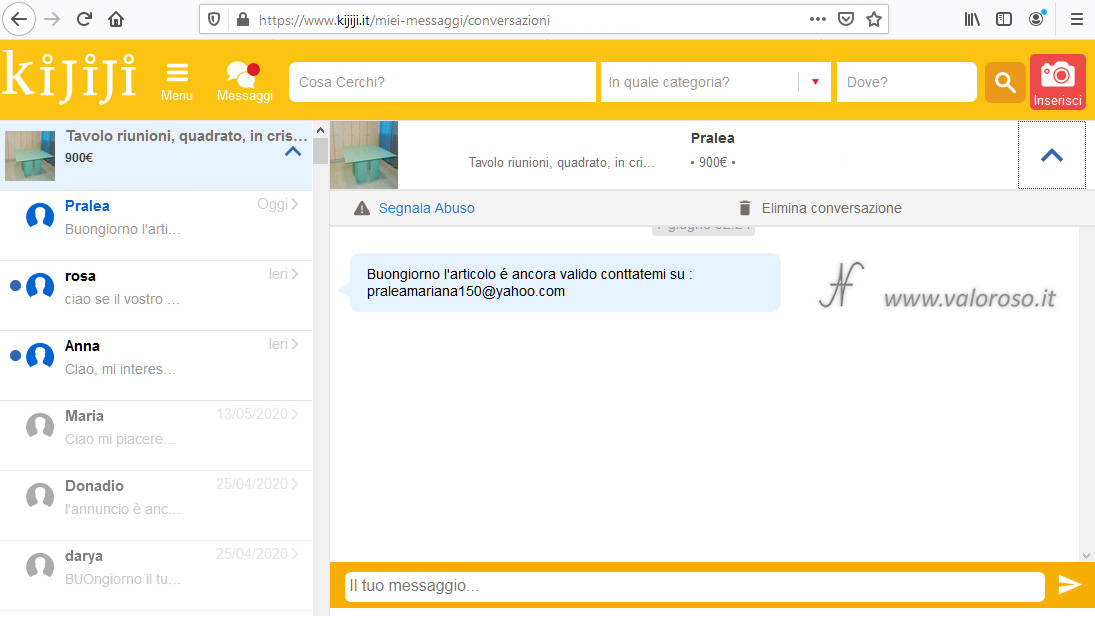
Of course, if the feature is available, it's good to report the buyer to the sales site.
If the buyer requests additional photos, as is permissible, you could consider signing them with your name (without surname) and date. In this way, if the self-styled buyer were a fraudster, it would not be possible for him to use them to scam other people.
Another scam, from which it is difficult to protect oneself, concerns the payment with Paypal. A buyer in bad faith, as soon as he received the goods, could declare that he had received them bad O damaged. In this case, most likely, the amount received from the seller would be reversed by PayPal.
In case of meeting in person, I dedicated a specific paragraph, continuing the reading of this article.
Protect yourself from scams on online sales sites, as a buyer
When you want to buy something used, especially if the seller is in the immediate vicinity of the buyer, the best solution is to go in person to see the goods, before buying it. The exchange would be immediate: the buyer receives the goods and pays for them in cash at the same time. In case of meeting in person, I dedicated a specific paragraph, continuing the reading of this article.
Any situation, if different from what is described above, may involve risks. Assuming you want to buy an item from a distant seller, of course, the seller would demand payment before shipping the goods. The seller may receive the amount and not ship the goods. In this case, to protect yourself from the scam, it is good:
- use PayPal as a payment instrument (send money as purchase of goods and services, avoiding using the "send money to a friend" function);
- claim one tracked shipping (by registered mail or express courier);
- check for any feedback of the seller, look at his profile Facebook, check how many years you have been a member, etc…
- in the case of expensive items, demand all the seller's data and make a live video call showing the object and its correct functioning.
To protect yourself from scams, if you do not know the seller, do not have his references or feedback, avoid using PostePay transfers and top-ups to send money.
In case of meeting in person
I dedicate a paragraph both to those who want to sell and buy, meeting in person with the counterparty.
In case of meeting in person, if possible, the ideal is meet in a public place during the day. Obviously, it is not always possible, especially if the object to be sold / purchased is located at home and is very voluminous. If the object is large, or needs to be tested in presence, you can be accompanied by a second person.
In case of meeting in person, I also suggest to be communicated, by the other party, all his data, including the mobile number. In this way, it is easier to confirm the appointment before leaving and being in the agreed place.
Do you know of other scams or have you been victimized? Send me the details, so you can include them in this article!
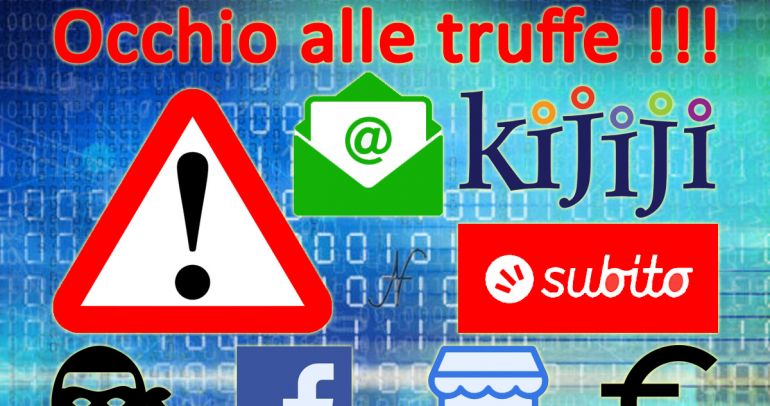

I couldn’t resist commenting. Well written!
Thank you!
I read this piece of writing completely, it’s useful article.
Thank you!
Great post. I was checking constantly this blog and I’m impressed! Very useful info. I care for such information a lot.
Thanks and good luck.
Thank you!
I needed to thank you for this excellent read!!
I certainly loved every little bit of it. I’ve got you bookmarked to check out new things you post…
Thank you!
Hello! I just would like to give you a huge thumbs up for your excellent information you’ve got right here on this post.
I will be coming back to your website for more soon.
Thank you!
Hey there! I just want to give you a huge thumbs up for the excellent info you’ve got right here on this post.
I am returning to your website for more soon.
Thank you for sharing your thoughts. I truly appreciate your efforts and I am waiting for your further post thank you once again.
Thank you!
Thank you!
Good day! Do you know if they make any plugins to safeguard against hackers?
I’m kinda paranoid about losing everything I’ve worked hard on. Any tips?
Hello. I suggest you to make backups, periodically, on supports that are not always connected to the computer.
These are truly good ideas.
Keep up wrinting!
Thank you!
These are actually wonderful ideas. You have touched some fastidious things here.
Any way keep up wrinting.
Many thanks!